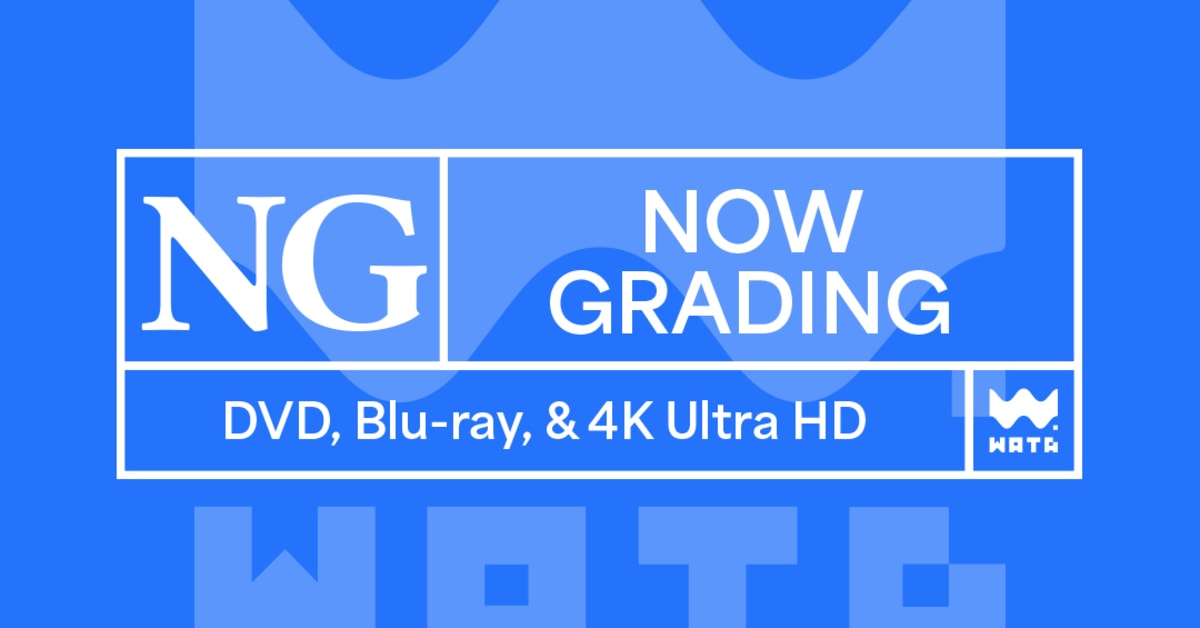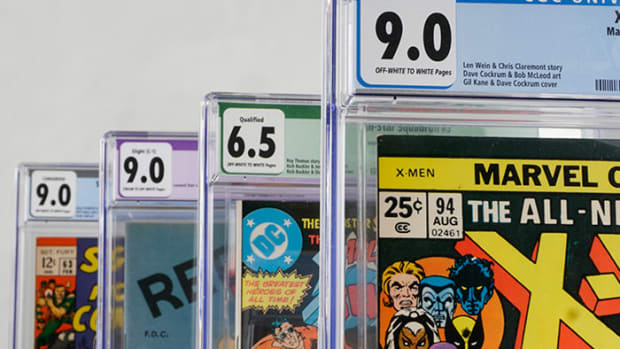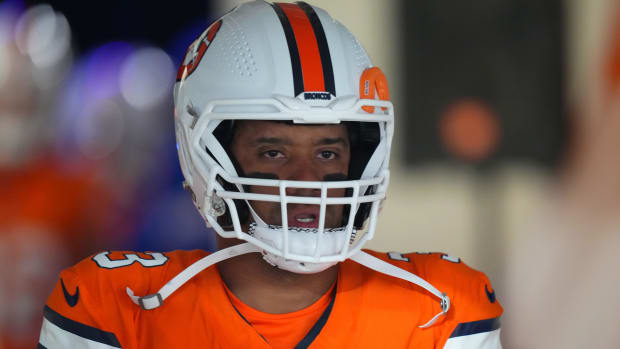
Wata Takes Next Step Toward ‘One-Stop Shop’ With Blu-rays, DVDs
Sports Illustrated aims to feature only the best products and services. If you buy something via one of our links, we may earn a commission.
PSA dominated the sports card and trading card grading space in 2023, and Wata is hoping to do the same for physical media in 2024.
Most known for grading video games, Wata recently made a push to add DVDs and Blu-rays to its lineup of grading services.
The latest in a series of improvements since being acquired by Collectors in 2021, the new grading options have Wata poised to take on a much larger share of pop culture-related grading moving forward.
Sports Illustrated recently spoke with Wata head Claire Shelton on the new services, what the biggest challenges have been and what it means for the company moving forward.
Questions and answers have been edited for length and clarity.
Sports Illustrated: What was the process for adding Blu-rays and DVDs like? Walk us through the key steps.
Claire Shelton: So there were a lot of steps in that. I think, first of all, we had to identify what is compatible media from the most basic level. We are limited to the sizes we can encapsulate, so that’s a product of our physical case size — that comes in six different sizes.
If something doesn't fit in any of those six case sizes, it’s often too cost prohibitive for us to launch that, at least without a much larger investment with other plans for more platforms. We couldn’t do a new case size for one platform — that wouldn’t make sense most of the time.
So that was the first step — figuring out what is compatible with our current cases. From there, what kind of expertise do we need to launch these platforms as well? From a grading perspective, what are idiosyncrasies of this platform that we’re familiar with that we can diagnose or that we can create standards for if it’s unique to other platforms? Thankfully for DVD and Blu-ray, it’s remarkably similar to the existing game platforms that use those sizes.
And the reason for that is the vast majority of the time, these DVDs and Blu-rays were made in the same factories that were manufacturing games of that era — they were literally using the same equipment with the same people at the same place. That’s really good from our perspective because we know what we’re getting into.
We also know basically the gamut of what could happen from a manufacturing perspective and how to diagnose those things. We have existing standards that will address basically all of those concerns.
And then from an authentication perspective, authentication is everything in our industry. Anyone can slap a number on an item and call it good, but if it’s not a legit item or it’s altered or there’s some irregularity with it, it’s worthless.
There’s research, right? So that’s identifying the variants, what goes on the label. Compared to video games, I would say that DVD and Blu-ray represented a much more substantial challenge than most video game consoles. The reason for that is that while video games have many print runs, for DVD and Blu-ray it was very much like the Wild West compared to video games.
I think the primary reason for that is they needed to release these things all the time and over a very long period of time. When you look at most video games, these games were not being released for a decade or maybe even longer. There’s different marketing firms and manufacturers and design agencies and these things were cycling through over time, which resulted in a lot of changes to the box art.
SI: Why did Wata decide now was the right time to add DVDs and Blu-ray as an offering?
CS: This is something we've wanted to do for a long time. But there were times in our past where we didn't have the expertise. And there were times that we didn't have the human power to create that huge database. We also had other things to prioritize within the business.
You know, we launched a really substantial full redesign of our case last year, which took up a lot of our resources. And then, even looking back a year further than that, in 2022 we had a huge launch of a bunch of additional platforms.
So until May or June of 2022, we didn’t offer grading for what we could call modern or ultra-modern, depending on the platform offerings. So we didn’t offer grading for PS3, PS4, PS5, the Nintendo Switch. There were a dozen platforms that we didn’t offer. So we kind of had to sort out our core competences first — we are Wata Games at the end of the day.
We needed to make sure we had as much within our home base covered when it came to being able to offer our services for games before we could expand to other types of media.
But we feel like we’re at a point now where we’ve added about as many platforms as we possibly can within our current case sizes, and now we’re at a point where we can branch out to those other types of media.
SI: The grading of media types like video games and movies is a pretty small space currently. How much does that factor into Wata taking on a new category?
CS: I think we look at what's happening elsewhere and we use that to determine if we should do this. Is a competitor doing this? And if we do this, can we do it better or offer something that’s different than what they’re offering? So that’s how we approached this project.
We’re confident that, from a grading and authentication perspective, we do have the best people in the business working on that. From an accuracy standpoint and just overall trustability standpoint, we are the best out there.
What sets us apart that the public can see is what’s on our label. It’s those unique variants where we’ll be able to chase down the print run and when this occurred. For example, a lot of times what will denote a variant from a non-variant could be one line of text on the back in small print or an icon change or a logo change. Other institutions might not catch that, right?
SI: What feedback did Wata receive that said this was the media category to expand into?
CS: We’ve definitely received feedback over time from people saying that we should expand into movies. There’s been a big push for VHS, for example. That’s something that didn’t come first when it comes to priorities because VHS is such an investor-focused market with how it’s held up within the collecting space, and we wanted to provide something for the average person — for somebody who just wants a trophy of their favorite item on their shelf.
We think that’s really cool and that’s something the average person can do without having to worry about the ROI of this item 10 years from now. Not to say that won’t come into play, but at a minimum we want to provide services for people who simply like what they’re interacting with.
Music is also something that people have wanted us to do, and that’s part of the reason why we expanded into soundtracks, but specifically video game soundtracks. So, that’s the kind of feedback we use to test the waters and see what people think.
We did something with film where we were accepting video game-adjacent DVDs — so not video game movies, but we were accepting something like when a special edition of a game comes with a DVD of a behind-the-scenes documentary. Nintendo put out some soundtracks that were on DVD, so we encapsulated those to see if people were interested in that and we got nothing but positive feedback.
SI: What movie genres does Wata expect to be the most popular and most submitted?
CS: So our customer base is quite varied in terms of what they like from what we’ve seen on the video game side. I think there’s kind of two camps. So, the first camp is those who love the classics. It’s going to be your NES-era person who is going to submit copies of 80s classics — Ferris Bueller's Day Off. It’s going to be all of those super nostalgic, high school films — Fast Times at Ridgemont High. Things of that nature.
And then the other camp skews a lot more modern. I think we’ll see a lot of animated films, whether that’s Studio Ghibli or [Makoto] Shinkai films. Even more mainstream like Pixar, Disney, DreamWorks, Disney Animation.
SI: Cover art has been a major driver behind video game collecting and grading — how much will that impact DVDs and Blu-rays?
CS: I think the same principles would apply there. I think, at its core level, if you think about what is on the box cover for films or TV on DVD and Blu-ray, it’s usually some variation of a movie poster or maybe it’s exactly the movie poster. Those movie posters are incredibly historic and that’s its own collectible industry.
Those posters are incredibly high effort and I would say, by and large, have had much larger budgets than basically any video game cover when it comes to design. In addition to that, I think there are way more unique movie covers compared to games. It’s a big difference in this regard. I think you see a lot more covers that will be fully embossed and have really nice textures or colors. It could even be a glow-in-the-dark cover. The movie steelbook industry is also huge.
SI: What impact, if any, did PSA and Collectors have on this?
CS: This is definitely a team effort with PSA and Collectors at-large. So Wata falls under the subheading of PSA pop culture, which encompasses Funko Pops and everything we offer as well as categories coming in the future. So for us, we share a lot of resources between those departments.
We have people who work cross-collaboratively across all of those teams and we have a very in-sync effort when it comes to being the one-stop shop not just for visual media or video games or film or music, but eventually all pop culture.
SI: What do you think this does for Wata moving forward?
CS: You know, our ethos in this and moving forward, our goal is to be the one-stop shop for all things digital media — hopefully someday all media. So I think we offer a really compelling service in that regard because there are other film grading companies, there are other music grading companies, and of course other video game grading companies. But there are basically none that you can send all of these items to in one order at no extra cost and get them back at the same time. It’s seamless, right?
What we’re trying to provide is if you collect physical media of basically any type, we can help you and we will get it back to you in a reasonable timeframe with the same quality across all those mediums.
Sports Illustrated aims to feature only the best products and services. If you buy something via one of our links, we may earn a commission.





